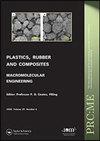Effect of surface modification and sodium dodecyl sulfate (SDS) on thermal properties of PMMA/SWCNT nanocomposites
IF 1.2
4区 材料科学
Q3 MATERIALS SCIENCE, COMPOSITES
引用次数: 0
Abstract
ABSTRACT In this study, the single-walled carbon nanotube (p-SWCNTs) and poly (methyl methacrylate) (PMMA) polymer nanocomposites were prepared by solution casting method. The effects of functionalization and sodium dodecyl sulfate (SDS) on the thermal properties of PMMA/p-SWCNT nanocomposites were investigated. Samples were characterised using BET, FTIR-ATR, SEM, DTA/TG, DSC, TEM and AFM. Morphological analyses showed that changes in the structure of SWCNTs with modification occurred and CNTs were tubular structure, homogeneously dispersed and nano-sized. Functionalised SWCNTs increased the first mass loss (Tmax1), the second mass loss (Tmax2) and glass transition temperatures (Tg) of PMMA. SDS assisted both better dispersion of CNTs and interaction between PMMA and CNTs. While PMMA/p-SWCNT-OH (0.1 wt.%) had the highest thermal stability in SDS-free medium, PMMA/SDS/p-SWCNT-O-APTS (0.1 wt.%) had the highest thermal stability in SDS medium. The maximum increases at Tmax1 and Tmax2 temperatures of nanocomposites were calculated as 49 and 13°C for PMMA/SDS/p-SWCNT-O-APTS (0.1 wt.%), respectively.表面改性和十二烷基硫酸钠对PMMA/ swcnts纳米复合材料热性能的影响
摘要本研究采用溶液浇铸法制备了单壁碳纳米管(p-SWCNTs)和聚甲基丙烯酸甲酯(PMMA)聚合物纳米复合材料。研究了功能化和十二烷基硫酸钠(SDS)对PMMA/p- swcnts纳米复合材料热性能的影响。采用BET、FTIR-ATR、SEM、DTA/TG、DSC、TEM和AFM对样品进行表征。形态学分析表明,改性后的SWCNTs结构发生了变化,CNTs呈管状结构,分布均匀,呈纳米级。功能化的SWCNTs增加了PMMA的第一次质量损失(Tmax1)、第二次质量损失(Tmax2)和玻璃化转变温度(Tg)。SDS有助于CNTs更好的分散和PMMA和CNTs之间的相互作用。PMMA/p-SWCNT-OH (0.1 wt.%)在无SDS介质中热稳定性最高,PMMA/SDS/p-SWCNT-O-APTS (0.1 wt.%)在SDS介质中热稳定性最高。PMMA/SDS/p- swcnts - o - apts在Tmax1和Tmax2温度下的最大增幅分别为49°C和13°C (0.1 wt.%)。
本文章由计算机程序翻译,如有差异,请以英文原文为准。
求助全文
约1分钟内获得全文
求助全文
来源期刊

Plastics, Rubber and Composites
工程技术-材料科学:复合
CiteScore
4.10
自引率
0.00%
发文量
24
审稿时长
4 months
期刊介绍:
Plastics, Rubber and Composites: Macromolecular Engineering provides an international forum for the publication of original, peer-reviewed research on the macromolecular engineering of polymeric and related materials and polymer matrix composites. Modern polymer processing is increasingly focused on macromolecular engineering: the manipulation of structure at the molecular scale to control properties and fitness for purpose of the final component. Intimately linked to this are the objectives of predicting properties in the context of an optimised design and of establishing robust processing routes and process control systems allowing the desired properties to be achieved reliably.
 求助内容:
求助内容: 应助结果提醒方式:
应助结果提醒方式:


